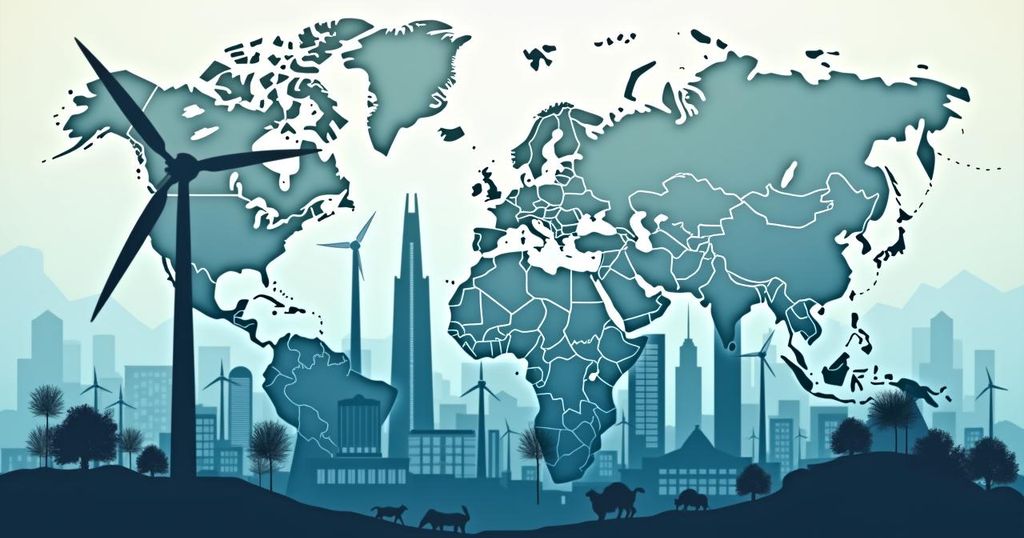China Allocates Over $100 Billion for Overseas Cleantech Investments in 2023 in Response to Trade Barriers

Chinese enterprises have invested over $100 billion in overseas cleantech projects since 2023, primarily to avoid tariffs imposed by the U.S., Canada, and EU. China leads the global market in electric vehicles, lithium batteries, and solar panels, raising concerns over potential market flooding. Industry leaders are strategically establishing manufacturing plants abroad, with forecasts indicating a significant surplus in capacity by 2030. Trade tensions illustrate the intricate relationship between climate goals and global market dynamics.
Since the beginning of 2023, Chinese enterprises have invested over $100 billion in clean technology projects abroad, primarily as a strategic response to trade barriers established by the United States, Canada, and the European Union. Research conducted by Climate Energy Finance (CEF) indicates that this significant influx of capital is motivated by the desire to escape steep tariffs that threaten the profitability of Chinese export goods in key sectors such as electric vehicles, lithium batteries, and solar panels. China commands a substantial share of the global market, controlling 32.5% of electric vehicle exports, 24.1% of lithium battery production, and a remarkable 78.1% of solar panel manufacturing. This overwhelming dominance has raised alarm amongst trade partners, who fear that surplus production capacity might be utilized to saturate markets unjustly, thereby reducing prices and undermining competition. Tariffs imposed by various nations are quite severe: the United States and Canada have levied 100% tariffs on electric vehicle imports from China, while tariffs on solar panels and lithium batteries stand at 50% and 25%, respectively. In light of these financial penalties, Chinese manufacturers are strategically investing in overseas facilities to continue operations in cleaner energy technologies. Industry leaders such as BYD and CATL are at the forefront of these initiatives. BYD is establishing a $1 billion manufacturing facility in Turkey to preempt the impending 40% tariff from the European Union. Concurrently, CATL is expanding its footprint by building new production plants in Germany, Hungary, and other European locales. Looking forward, a report by the Grantham Institute forecasts that two-thirds of China’s clean technology capacity could surpass domestic demand by 2030, thus compelling the nation to seek broader export markets. The anticipated total solar production capacity is expected to reach 860 gigawatts in that timeframe. Despite the challenges posed by tariffs, Chinese officials have condemned these measures, arguing they may adversely affect global climate change initiatives. Senior climate envoy Liu Zhenmin noted that disengagement from Chinese manufacturing could increase the global energy transition costs by approximately 20%. As the dynamics of global trade and climate policy evolve, China’s growing influence in the cleantech sector remains a critical issue.
The article discusses the recent surge in Chinese investments in overseas clean technology initiatives, totaling over $100 billion since 2023, largely as a strategic measure to circumvent high tariffs imposed by Western countries. China has established itself as a leader in several crucial segments of the cleantech market, including electric vehicles, lithium batteries, and solar panels. The global trade environment is tightly interwoven with climate objectives, leading to tensions that have prompted Chinese firms to seek alternative manufacturing locations to maintain market presence and avoid punitive tariffs. Domestic demand in China is expected to limit growth potential by 2030, further motivating the need for expansion into international markets.
In summary, the substantial foreign investments made by Chinese companies in cleantech reflect a strategic maneuver to evade tariffs imposed by major trading partners. As China continues to dominate critical sectors within the global cleantech industry, the implications of these investments extend beyond economics, influencing worldwide climate initiatives significantly. The response from Chinese officials further underscores the complexities of international trade and climate policy, as concerns mount regarding the potential negative impact of trade barriers on global sustainability efforts.
Original Source: esgnews.com




